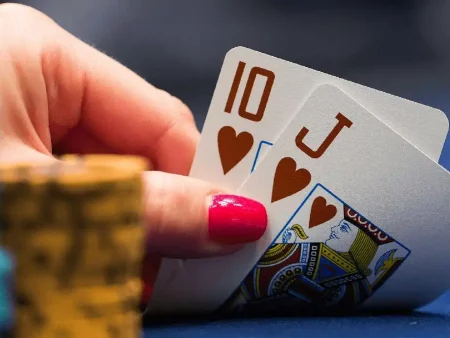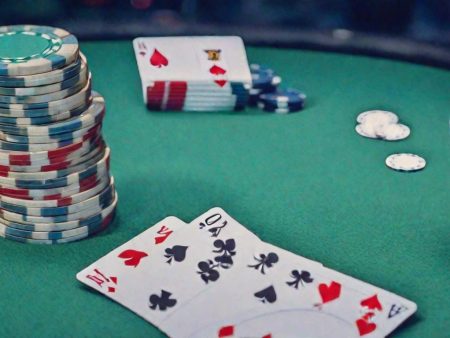In poker, an overcard is a card that is in your hand and has a higher value than the highest card on the table. This concept is extremely important because it affects the way players make decisions and place their bets during the hand. Let’s take a closer look at what an overcard is and how it affects the game.
Basic information about Overcard
Before you start playing in one of the top casinos with live dealers, a beginner needs to read the rules, know all the terms and combinations well. What you should know about Overcard in the first place.
- By definition, an overcard is a poker element at a poker player’s disposal that is superior to the highest overall card on the table. For example, if the board is 8 of spades 4 of diamonds K of clubs and you hold A of diamonds Q of clubs, the King (K) is the common card on the table and your Queen (Q) is the overcard because it has the highest value.
- Having an Overcard affects your chances of winning the hand. If you have an overcard to the general layout on the board, it increases the possibility of improving your hand on the following streets.
- It is often used for various poker strategies. If you have an overcard to the general card, it becomes possible to bet and raise to put pressure on your opponents. After all, they can hold hands that are currently less strong than your potential hand with the overcards. This combination also affects the choice of whether to stay in the game or fold.
- The strength of this hand depends on the context. It can be stronger in situations where the stakes are high and the participants are active, and less significant when the hand is just starting. It is important to consider what cards have already been dealt and the overall situation on the table.
Such situations occur in different game scenarios: on the flop, turn, and river. The use of overcards to create profitable combinations and control the situation is an important aspect of the strategy.

Factors affecting the use of overcards
The play of an Overcard in poker depends on many factors. Understanding and taking into account these factors will allow the player to make more informed decisions in the game.
- It is very important to take into account the position of the poker player on the board. In early positions (closer to the small blind), playing overcards is risky, as the opponents at the table have not yet shown their aggression. In later positions, you can control the game better and more accurately assess the strength of your opponents.
- A player who becomes a preflop aggressor has more control over the situation on the table. This means that they can use the overcard to counterbet and force their opponents to fold their weakest elements.
- The more participants in the process remain in the hand, the higher the probability that one of them has a strong hand. Overcards are less effective against several opponents, so it is important to estimate how many players are involved in the hand.
- Analysing your opponents’ playing style and bets helps you determine what hands they are most likely to have. If an opponent is aggressive and often calls, an overcall may be more valuable because you can take advantage of their aggression. If the opponent is conservative and rarely bets, this move is less effective.
- The openings on the board are also important. For example, if there are cards on the table that improve the power of the Overcard (for example, if you have a King as an Overcard and another King appears on the table), this can make your hand stronger.
- These factors may influence your decision to play the Overcard. If you have a small stack, it may be beneficial to go all-in with an overcard to double your stack. The size of your current pot is also important, as it determines how much you should play the overcard.
- If an opponent calls after the flop, it can be an indicator of the strength of his hand. The decision to call with an overcard will help you figure out whether to continue the game.
- Considering all of these factors and analysing your specific situation will help you make more informed decisions about overcarding in poker.
Read also: What is an add-on in poker and how to use it in tournaments.
Some examples of how to use Overcard
Let’s look at three scenarios that have a good chance of happening. It doesn’t matter if you play in one of the top online casinos or at a real gambling table.
- Alex holds A spade K clubs, and the flop shows K clubs 5 hearts 2 diamonds. In this situation, the position is quite promising, there is a hit on the king, and the ace is an overcard in relation to the flop. This situation gives Alex an advantage for two key reasons. Firstly, if another ace is dealt on the following streets, he will receive a second powerful pair, which will significantly strengthen his hand. Secondly, even if the remaining cards on the board are not aces, Alex will still be the leader on this board. He has a top pair with an excellent kicker, which makes his flop decision quite reasonable.
- Victor holds K diamonds Q clubs, and the flop is 7 clubs 5 hearts 2 diamonds. This position is not as strong as in the previous case, but Victor still has a good chance of winning the hand. The reason is that he has two strong overcards – a king and a queen. This means that he has a 25% chance of hitting either of these on the turn or river. Even if he doesn’t get a king or queen, there is still a chance to win the pot, assuming that none of his opponents are on the board and no one has a higher overcard like an ace.
- Max holds the cards Q diamonds 7 clubs and the flop is A clubs K diamonds Q hearts. In this situation, Max is faced with a difficult decision, despite the fact that he is in top pair. The flop contains two overcards – an ace and a king. This significantly weakens his position, as other players could come to the flop with hands containing an ace or a king. Therefore, in order to determine the ‘seriousness’ of his opponents’ intentions and check how strong his position is, Max can use a bet that will help him sift through the strong hands and make the right decision in this difficult situation.
Read also: What is a trip in poker.
Understanding and knowing how to work with different combinations in poker is a key skill needed to achieve success. This term opens up a lot of opportunities for players to make informed decisions, develop a strategy and analyse the strength of their hands. Don’t forget that overcards can work both in your favour and against you, depending on the circumstances and your actions at the table. In conclusion, if you were looking for an online casino with a minimum deposit of twenty USD, please follow this link.
FAQ: What is an overcard in poker?
What is an overcard in poker?
An overcard in poker is a card that has a higher rank than the cards on the board (flop, turn or river). For example, if the board is 8-7-4 and you have a king and queen in your hand, then your king and queen are overcards.
Яка роль оверкарт у покерній стратегії?
Overcards can play an important role in game strategy:
- Enhancement Potential: Overcards can help improve your hand if the board gives an appropriate hand (such as a pair, straight, or flush).
- Aggression: You can use your overcards to play aggressively by bluffing or raising to gain an advantage in the game.
How to play with overcards?
Playing with overcards depends on several factors:
- Board: Analyze the board and determine if there is a chance to improve the hand due to overcards.
- Position: Use overcards to play aggressively depending on your position at the table.
- Opponents: Assess the playing style of your opponents to decide whether to continue playing with overcards.
What are the strategies for playing with overcards?
Strategies for playing with overcards may include:
- Aggressive Play: If you have overcards, you can use an aggressive strategy to pressure your opponents and force them to fold.
- Pot size control: Use your overcards to control the pot size if the board doesn't give an obvious winning hand.
- Opponent Analysis: Consider your opponents play style and use your overcards to counter their strategies.
What mistakes should be avoided when playing with overcards?
Mistakes to avoid:
- Belief in the strength of overcards: You should not always consider overcards strong, especially if the board does not support your hand.
- Misjudging opponents: Neglecting how opponents play can lead to poor decisions.
- Unrealistic bets: Don't bet too big unless you are sure that your overcards can win.
Where can I learn more about overcards and strategies for playing with them?
You can learn more about overcards through poker books, video tutorials, articles and online courses. Resources specializing in poker strategy can also provide useful information on how to effectively use overcards in the game.






